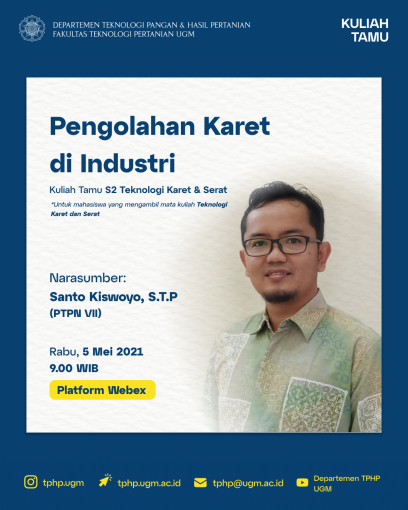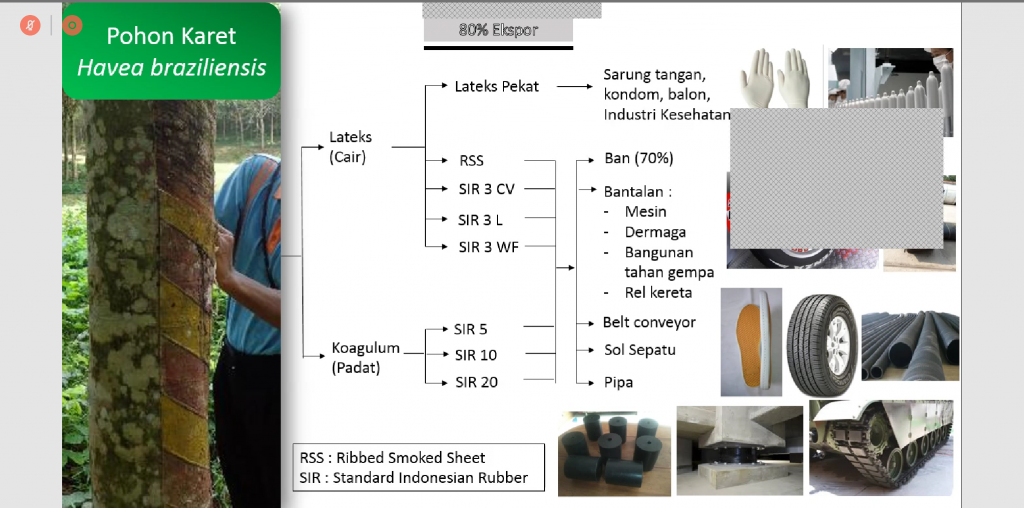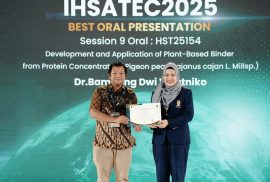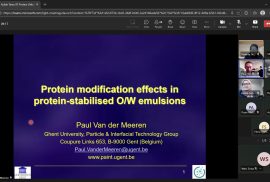
The Rubber and Fiber Technology course held a guest lecture on Wednesday, May 5, 2021 at 09.00 – 10.40 WIB. This guest lecture carried the topic of Rubber Processing in Industry with the speaker, Santo Kiswoyo, S.T.P., M.Sc. from PTPN VII and guided by Dr. Manikharda, S.T.P., M.Agr. as the moderator. This guest lecture was conducted through Webex platform and attended by 6 participants.
Rubber is a basic material to produce products that are useful for the needs of living things, especially humans. Rubber is produced from rubber trees with the Latin name Havea braziliensis and new rubber can be tapped if the plant is about 4-5 years old and the trunk circumference reaches 45 cm. Rubber tapping is done every 3 days to give time for the formation of the tapping panel.

Indonesia produces rubber products in the form of upstream industrial products (semi-finished), such as RSS (Ribbed Smoked Sheet), SIR (Standard Indonesian Rubber), and concentrated latex. For SIR itself, there are various kinds, including SIR 3 CV, SIR 3 L, SIR 3 WF, SIR 5, SIR 10, and SIR 20. The difference is in the level of impurities and in the processed materials used; SIR 3 CV, SIR 3 L, and SIR WF are made from latex (liquid), while SIR 5, SIR 10, and SIR 20 are made from coagulum (solid).
Based on its quality, SIR 20 (SIR LG) is the lowest quality rubber product because it has the highest impurity content at 0.2%. However, SIR 20 is the rubber product that has the highest market demand because it can be used for a variety of products, such as tires, sandals, shoe soles, and others.
Although the need for rubber continues to increase along with the increasing standard of living, the rubber industry in Indonesia still has shortcomings in terms of productivity and post-harvest handling, such as the type of rubber tree seeds planted, fertilizers used during planting, irregular tapping time, lack of technology, and the addition of chemicals to rubber trees with the aim of tapping more. However, the use of too many chemicals can cause the rubber tree to die so that it cannot produce liquid rubber. In addition, there is unfair business competition in the form of cheating both by farmers, traders of Rubber Processing Materials (Bokar), and by the crumb rubber industry so that it is necessary to increase supervision by examiners of the crumb rubber industry.
The Rubber and Fiber Technology Guest Lecture video can be accessed via the following link:
[embedyt] https://www.youtube.com/watch?v=b6_kRr_gaeI[/embedyt]




